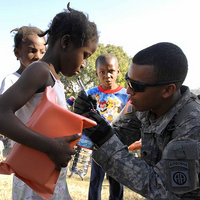News broke Sunday night that Jean-Claude "Baby Doc" Duvalier had returned to Haiti after an absence of 25 years. The dictator's return capped off a difficult year for Haiti, as the island continues to recover from an earthquake, a hurricane, a cholera outbreak, and a contested presidential election. Many worried that Duvalier intended to take advantage of the chaos and suffering that still plagues the country in order to regain influence. Though Duvalier has now been charged with corruption dating from his time in power and may instead face trial, the alarm triggered by his arrival is a reminder that, as bad as things are now in Haiti, they can still get worse.
No one thought that 2010 and 2011 were going to be easy years for Haiti, but at one point it looked as if the worst of the damage could be contained. In the immediate aftermath of the January 2010 earthquake, the United States, the United Nations, and the international community sprang to the country's aid. U.S. Navy ships and aircraft, including the aircraft carrier USS Carl Vinson, the amphibious assault ships USS Bataan and USS Nassau, and the hospital ship USNS Comfort, deployed to Haiti to deliver relief supplies and medical assistance. The humanitarian operation faced some initial problems, such as difficulties coordinating medical facilities at sea and on land, and confusion over access to airfields. But the intervention helped provide clean water and medical care to victims of the quake, with U.S. Marines helping to distribute the aid while also maintaining order.
Ideally, the U.S.-led intervention was meant to go down as a Western-hemisphere version of the 2005 tsunami relief operation, in which the U.S. Navy saved thousands of lives and contributed to stability in the wake of disaster. During that effort, the U.S. military demonstrated both the capacity to help and the political acumen to appear as a supporting player, in a display that apparently embarrassed China. A similar intervention in Haiti, it was thought, could win friends, reassure allies, and quiet critics in Latin America. The intervention almost certainly did save lives: The situation in Haiti following the earthquake was desperate, and Haitian state capacity was extremely low. However, few will be likely to point to Haiti as a success story, as Haitian state institutions have still not recovered, and the effects of the earthquake remain depressingly apparent.

